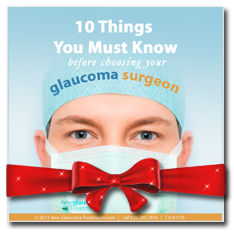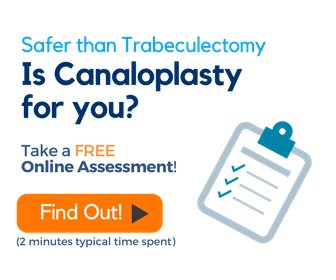Choose The Right Glaucoma Specialist For You
More than that Meets the Glaucoma Eye
Sight is one of the basic senses we use in everyday life and often take for granted. Marsha is just one of the many elderly people who are diagnosed with acute open angle glaucoma each day. Glaucoma is a leading cause of blindness all over the world. Failure of the eye’s natural canals to drain raises the pressure inside the eye which ultimately destroys the nerves responsible for vision.

Glaucoma is called the silent sight stealer because it can go on for years without any symptom until the person’s vision is suddenly compromised. Any glaucoma patient will tell you of their terror and anxiety of going blind. If you or loved one experience any glaucoma warning signs like eye pain, blurring of vision and vomiting, it is important to have you or their eyes checked by an eye doctor or glaucoma specialist. Glaucoma is irreversible and progressive once damage to the nerves of the eye has begun, and it is a glaucoma specialists’ job to prevent this from happening.
Get This Educational eBook [FREE!]
10 Things You Must Know Before Choosing Your Glaucoma Surgeon – Find an exceptional eye surgeon in less time than many people devote to choosing their next car. >> Grab Your Copy Now!
Wanted: Eye Heroes
A patient diagnosed with glaucoma has one question in mind: Where can I find a glaucoma specialist? There are many avenues by which one can find a glaucoma specialist. One of them is through direct referral from your family doctor or the recommendation of a friend or relative who previously were under their care. In the internet age, it is also easy to find online a glaucoma specialist in your area. However, not all eye doctors are considered as glaucoma specialists. It takes years of study and hands-on training on glaucoma management and surgery to be a good one.
An eye doctor is known as an ophthalmologist. He earns this after four years of medical school and undergoing three to four years of residency training in Ophthalmology. It is during this time that she learns the rudiments of diagnosis and treatment for various eye diseases. A resident has to pass a series of examinations in order to be certified by a country or state professional board where she intends to practice. However, some proceed to another year or two of further training called fellowship, to concentrate on a specific eye disorder one is interested in, like cataract or glaucoma for example. Aside from theoretical study of the principles of glaucoma, a fellow must have hands-on training by seeing glaucoma patients every day, before she can call herself a glaucoma specialist.
How to Save an Eye
In the era of modern medicine, a glaucoma specialist has a huge armament of treatments available which includes medical eye drops, laser, artificial drainage devices, and lastly surgery. A glaucoma specialist will first exhaust medical means through different types of drugs like beta blockers to prostaglandin analogs to lower intraocular pressure before resorting to eye surgery. Although eye medications are very effective, some patients are not suited for them. Some are non- compliant or too sensitive to their side effects, or like in Marsha’s case, require a more rapid way to bring down the pressure by glaucoma surgery.
For the past one hundred years glaucoma surgery was synonymous to trabeculectomy. But with the advent of surgical breakthroughs in microsurgery and state-of the-art catheters and flexible scopes, patients like Marsha have more options like viscocanalostomy and canaloplasty to name a few. Through these modern medical wonders, glaucoma surgeons can operate on delicate and fine structures of the eye safely without endangering them from infection and injury. Due to the technical nature of these novel procedures, only a few glaucoma specialists are qualified enough to do them. Majority are reluctant to learn these new methods due to lack of existing clinical evidence of their safety and efficacy. Moreover some glaucoma surgeons are daunted by the steep learning curve and training it requires. As a patient, you have to be aware of these treatment options and discuss them to your glaucoma specialist.
Glaucoma Specialists versus Glaucoma Surgeons
A glaucoma specialist’s knowledge depends on the experience she has acquired through years of private practice. Due to personal inclinations or preference, some choose not to train in novel surgical techniques. Therefore, in certain respects, not all glaucoma specialists are trained to do certain glaucoma operations. Unlike a glaucoma specialist who has earned her knowledge in formal fellowship training, a glaucoma surgeon has to earn her reputation by doing countless surgeries to master her craft. A glaucoma surgeon’s edge therefore lies on a specific surgical technique he does best. A good example for this would a surgeon trained to do a non-invasive procedure like canaloplasty. To accomplish this, she has to apprentice under a more experienced surgeon who has done a number of canaloplasty cases himself.
What You See is What You Get
Now that you glaucoma specialist has decided for glaucoma surgery, the next question would be: “how do I assess the skills of a glaucoma surgeon?” To do this you must check his professional track record; not just in the number of patients he has operated on but by what they actually say about him or her after their surgery. Like any craft, quality is always evident on the service rendered. In the case of a glaucoma surgeon, how early and effectively he or she can arrest the onslaught of blindness is your hero or heroine. But whatever the surgical technique she uses to restore intraocular pressures to normal or near normal levels, a good glaucoma surgeon does it without undue harm to the patient during and after surgery.
Finally, in choosing the right glaucoma specialist for you, you must not only consider her technical expertise but also her bedside manners. Often forgotten in the world of ultra modern and highly specialized medicine is good patient care, it is the personal touch a doctor to her patient. It shows in the way she listens and touches her patient. Or it could be as simple as explaining your glaucoma in a level that you can understand, including your treatment options and the risks it entails. Doctors who possess this quality have high patient referrals and positive testimonials from former patients. They win you over by seeing you as a whole person and not just another piece of eye to apply his magic hands and try out his wonder gadgets on.
Related Articles:
- What Is A Glaucoma Specialist?
- Do I Need A Glaucoma Specialist?
- Why Do Some Good Eye Surgeons Not Take Fellowship?
- What Training Is Required To Become An Interventional Ophthalmologist?
- Are all Canaloplasty Surgeons Glaucoma Specialists?
- 10 Things You Must Know Before Choosing Your Glaucoma Surgeon
- Glaucoma Surgeon Insider (Ideally for Eye Surgeons)



